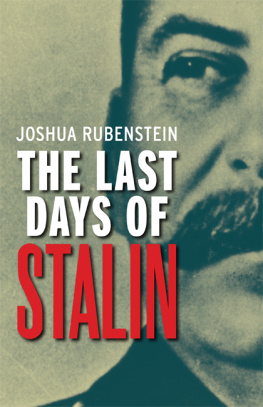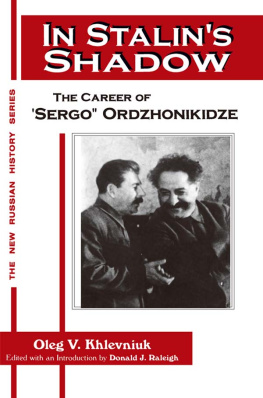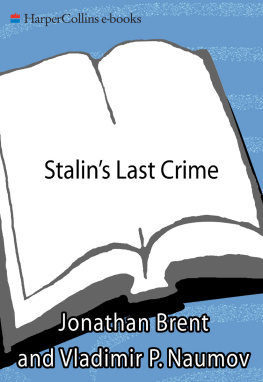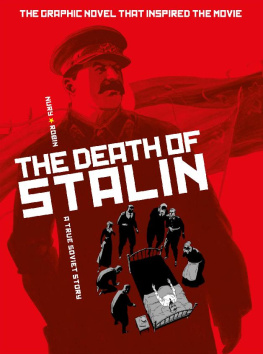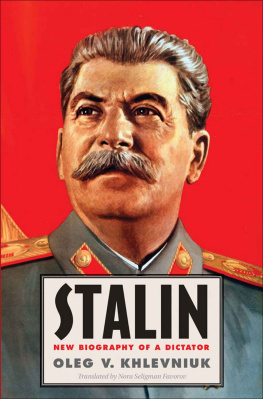

Copyright 2016 Joshua Rubenstein
All rights reserved. This book may not be reproduced in whole or in part, in any form (beyond that copying permitted by Sections 107 and 108 of the U.S. Copyright Law and except by reviewers for the public press) without written permission from the publishers.
For information about this and other Yale University Press publications, please contact:
U.S. Office:
Europe Office:
Typeset in Adobe Caslon Pro by IDSUK (DataConnection) Ltd
Printed in Great Britain by Gomer Press, Llandysul, Ceredigion, Wales
Library of Congress Cataloging-in-Publication Data
Rubenstein, Joshua, author.
Title: The last days of Stalin / Joshua Rubenstein.
Description: New Haven : Yale University Press, 2016. | Includes bibliographical references and index.
LCCN 2015047378 | ISBN 9780300192223 (hardback : alkaline paper)
LCSH: Stalin, Joseph, 1878-1953Death and burial. | Stalin,
Joseph, 1878-1953Relations with Jews. | Stalin, Joseph,
1878-1953Political and social views. | Stalin, Joseph,
1878-1953Influence. | Heads of stateSoviet UnionBiography. | Soviet
UnionPolitics and government1936-1953. | Social changeSoviet
UnionHistory. | Soviet UnionForeign relations1953-1975. | BISAC:
HISTORY / Europe / Russia & the Former Soviet Union. | BIOGRAPHY &
AUTOBIOGRAPHY / Presidents & Heads of State. | HISTORY / Military / World
War II. Classification: LCC DK268.S8 R83 2016 | DDC 947.084/2092dc23
LC record available at http://lccn.loc.gov/2015047378
A catalogue record for this book is available from the British Library.
10 9 8 7 6 5 4 3 2 1
CONTENTS
ACKNOWLEDGMENTS
A number of colleagues and friends helped me with this book. I am especially grateful to Heather McCallum, my editor at Yale University Press in London, who proposed the project to me. She proved to be a reliable friend and resource, firm, helpful, and clear-headed as I made my way through a thicket of historical events and challenges with the manuscript. My agents, Robin Straus and Andrew Nurnberg, were also particularly encouraging at moments when I wondered if I could sort out what needed to be said and how to get there.
Several colleagues at the Kathryn W. and Shelby Cullom Davis Center for Russian and Eurasian Studies at Harvard University, which has been my intellectual home for over three decades, provided much needed guidance and assistance. I relied on Mark Kramer for his remarkable knowledge of documents and historical writing on the period; he also proved to be a patient and insightful reader of the manuscript. Hugh Truslow, the librarian for the Davis Center Collection, was always ready to help me track down an obscure volume or find my way through online archival materials. He and other staff members at Harvards Widener Library provided much needed bibliographic support.
Kimberly St. Julian worked as my research assistant when I first began this project, while Sydney Soderberg located material for me at the Dwight D. Eisenhower Presidential Library in Abilene, Kansas. I want to thank both of them for their help.
David Brandenberger at Richmond College was among the colleagues I first approached when I was considering how to fashion a book about the events surrounding Stalins death; his feedback and encouragement were always welcome. Maxim Shrayer of Boston College was also a source of ideas and inspiration. My longtime friend, Boris Katz, was kind enough to read parts of the manuscript and, as always, was forthright and thorough in his criticism.
In addition, I would like to thank Sergei Nikitich Khrushchev who welcomed me to his home in Cranston, Rhode Island, near the outset of my research. I very much benefited from our conversation about his father and his own experiences during those fateful days in March 1953. And Tatiana Yankelevich shared a vivid story with me from the life of her mother, Elena Bonner, who came close to being a victim of the Doctors Plot. Jonathan Brent also shared a good deal of material with me from his extensive collection of documents about the Doctors Plot.
Finally, my wife, Jill Janows and our son, Ben, had to endure yet another deep dive into Soviet history which required me to be in libraries and behind a study door at all hours of the day and night. Their patient love continues to be a crucial source of emotional support.
INTRODUCTION
Joseph Stalin collapsed and died in an atmosphere of medieval recrimination. It was March 1953. The Kremlin seethed with fears of a broad, new purge against members of his Presidium. A public campaign against treasonous Jewish doctors threatened to engulf all of Soviet Jewry. Tensions with the West were more and more alarming: after three years of fighting, the war in Korea continued unabated while American and Soviet armies faced each other in a divided Germany. At the same time a new American administration led by President Dwight David Eisenhower and Secretary of State John Foster Dulles had come into office that January with the intention of rolling back communism only to find themselves confronting Stalins heirs and a host of unexpected reforms.
At home and abroad Stalins longtime comrades-in-arms faced a host of difficult dilemmas. They understood the need to release prisoners from the Gulag, disavow the Doctors Plot, and provide higher living standards for the population. They also offered concessions to the West, a dramatic peace offensive that included renewed and serious negotiations to end the fighting in Korea and reduce tensions in Europe, including in the satellite countries in Eastern Europe where Stalins extreme policies were leading to popular unrest against communist rule.
The regime feared that his death would lead to panic and disorder, which in turn could undermine their legitimacy and the authority of one-party rule. They had to devise a way to distance themselves from Stalins crimes while insisting that the Communist Party not be held responsible for the tyrants brutality, that the party was more to be pitied for what it had endured than condemned for what it had applauded. This dilemma arose immediately after his collapse, then continued for decades, with occasional flashes of candor and truth followed by renewed, official respect for Stalin and his leadership. It affected his medical treatment, the conduct of his funeral, relations with the West, and everyday life in the country.
This book opens with Stalins death, moves backward in time to the Nineteenth Party Congress in October 1952, when Stalin made his last public speech, then proceeds through the winter of 195253 when the Doctors Plot and a broad campaign against the countrys Jews unfolded. It explores how the Soviet and American press covered Stalins death and how the new Eisenhower administration reacted to the dramatic changes in Moscow that followed. It concludes with the arrest of Stalins longtime security chief, Lavrenti Beria, in June.
Stalins death introduced an unprecedented opportunity. It gave his heirs the chance to reverse many of his policies and move the country forward in a hopeful, more relaxed direction. It presented the United States with an urgent need to review assumptions about how it could work with a brutal and menacing dictatorship that had suddenly lost its leader and seemed ready to negotiate a new beginning to its relations with the outside world. For complex reasons both Soviet and Western governments could not overcome the decades of mistrust that divided them. The arms race persisted. The division of Germany and Europe continued. The Cold War reached into far corners of the world where tensions between East and West spilled over into proxy conflicts of untold misery and destruction. And in the Soviet Union the promise of change that highlighted the initial months that followed Stalins death collapsed into a pattern of exhilarating reform and disheartening repression that lasted until Mikhail Gorbachev pushed the limits of reform so far that the Soviet regime could no longer survive. Stalins death gave the Kremlin and the West the chance to escape the grim reality of his nightmarish imagination, a challenge they failed to accomplish. That failure haunted the world for decades to follow.
Next page
